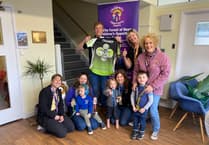FOR this year’s Dementia Action Week (May 15-21), we’re shining a light on a local ambassador who’s helping to support those who suffer with the illness and their carers in the local area.
Ken Vowles, aged 82 and from Chepstow, is well-known locally as a former Chairman of Chepstow Rugby Club, but in recent months he’s taken on a different role in the community.
After his wife Judy, who had dementia, sadly passed away 18 months ago, Ken became involved in a local support group, and has since become an ambassador for Dementia UK for south-east Wales and the borders.
His role is to coordinate fundraising for the charity, which works to support dementia sufferers and their carers around the country, and to work with other local support groups to expand their scope.
He says his main aim is to raise awareness locally of what dementia is and how it effects people and their families.
On the impact dementia has had on him personally, Ken said: “My wife had dementia that started about 10 years ago with memory loss, which is the initial Alzheimer's type of dementia.
“Then that progressed through various stages and she ended up with vascular dementia.
“The different stages of dementia have different effects. It can be memory loss, sometimes you drop things, sometimes you can't remember where you're going or where you’ve come from.
“The physical side is you can't feed yourself, you can't drink for yourself, you have to have someone there to help you, and there are various things that can upset you fairly easily.
“Then six years ago, she had started having seizures and she had a small stroke as well.
“So we then went through a process of having her in hospital, at the Royal Gwent in Newport and at Chepstow Hospital.
“Five years ago we decided that we would find a nursing home for her or we would have her at home.
“Unfortunately, I visited about 15 nursing homes around the Chepstow area and not one of them was able to deal with the effects of dementia in that particular state, so we decided to have her at home.
“She was at home for a long period and I looked after her myself 24/7, and then we had carers come in four times a day to help.
“Then, unfortunately, she developed bronchopneumonia 18 months ago, and unfortunately she passed away then.
“We’d been married for 60 years and a day when she passed away. I’m pretty sure she decided that she was going to last that extra day.”
Ken explained how the loss of his wife continues to have a big impact on him everyday.
“A lot of people say that you get used to it. You don't really. There's always something missing.”
On how he became involved with Dementia UK, Ken said: “Soon after I became involved with a group in Caldicot, which is a meeting on Monday afternoons with people with different illnesses - some have MS, some are disabled, some have lost partners.”
He then became loosely connected with Dementia UK by doing a bit of fundraising for them.
“Dementia UK were looking for ambassadors to represent them to try and raise funds, make people more aware and to make areas dementia friendly.
‘In January, they appointed me as their local volunteer ambassador, which meant going to some training sessions to be able to speak to people that have had issues with dementia, carers and so on.
“And I now go to a number of meetings locally where I talk to people about dementia. I go to church meetings, Women's Institutes, Rotary, Lions, and dementia friendly cafes.
“My prime job really is to make people more aware of what dementia is, what it's all about and the effects it has on people.
“And particularly on the carers - the people that are left behind.”
National charity Dementia UK works to support people effected by all kinds of dementia, including Alzheimer’s, by providing specialist nurses to work with families.
The charity’s Admiral Nurses help families with complex needs to solve problems, “so they have the strength to cope with the bad days, and the energy to enjoy the good days.”
National Dementia Action Week is the biggest and longest running awareness campaign led by the Alzheimer’s Society.
In 2022, the campaign encouraged people who know someone who is experiencing dementia symptoms to seek help.
Throughout the week, the Alzheimer’s Society saw a 43 per cent increase in calls to its dementia support helpline.
This year, it is focusing again on increasing diagnosis, following a sustained drop in diagnosis rates for the first time ever recently.
Research has found that some of the barriers to diagnosis include the misconception around memory loss “just being part of getting old”, being in denial, and referral times to specialists.
The charity says: “Getting a diagnosis can be daunting, but we believe it’s better to know. And so do 91 per cent of people affected by dementia.”
This year’s campaign will involve more healthcare professionals to help build on the success of its Symptoms Checklist, which was launched last year.
All the advertisers on this page have made a donation to the charity as part of the campaign.
For more information and to view the checklist, go to www.alzheimers.org.uk/get-involved/dementia-action-week.




